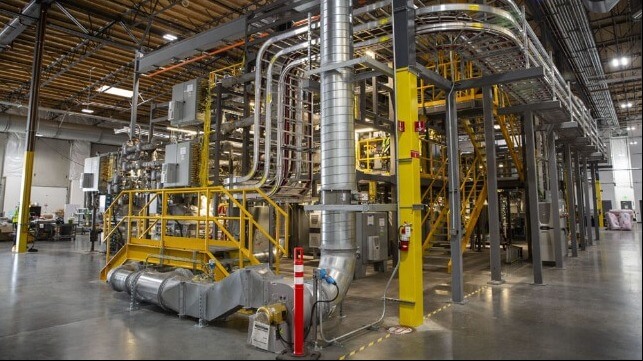Test Facility Marks Milestone in Development of Molten Salt Reactor

The efforts to develop a new generation of nuclear power for the commercial maritime industry are taking a step forward with the completion of an Integrated Effects Test facility. Developed by Southern Company Services working with TerraPower, the test is the world’s largest chloride salt system developed by the nuclear sector. The companies are calling it a crucial milestone in the development of TerraPower’s first-of-a-kind Molten Chloride Fast Reactor (MCFR).
The project culminates years of separate effects testing and is expected to demonstrate how the MCFR technology will perform in delivering a commercial-scale, molten salt reactor energy source by 2035. More than 70 years after the maritime industry first considered nuclear, it is once again drawing widespread attention as a potential future power source that would be carbon-free and due to the new design concepts be economic and safe to operate.
“The IET facility is a huge step forward in commercializing molten salt reactor technology that will help the U.S. transition to a new, clean-energy economy and help position the U.S. as a leader in the development of advanced reactor technologies,” said Dr. Kathryn Huff, assistant secretary for the U.S. Department of Energy’s Office of Nuclear Energy during a dedicate event for the facility conducted in September.
Located at TerraPower’s laboratory in Everett, Washington, the Integrated Effects Test is a nonnuclear, externally heated, up to 1-megawatt multiloop system to support the future deployment of a fast-spectrum salt test reactor. The project continues work initiated in 2015 by Southern Company Services and TerraPower under the U.S. Department of Energy (DOE) Advanced Reactor Concepts (ARC-15) award, a multiyear effort to promote the design, construction, and operation of Generation-IV nuclear reactors.
The partners in the project said that the Integrated Effects Test signals important progress in the technology demonstration roadmap for TerraPower’s MCFR. Data from the operation of the test will help validate the thermal hydraulic and safety analyses needed for the MCFR. The system will also support the development and operation of the Molten Chloride Reactor Experiment at Idaho National Laboratory, a less than 200-kilowatt reactor meant to provide experimental and operational data. Both the Integrated Effects Test and the Molten Chloride Reactor Experiment will inform the design, licensing, and operation of an approximately 180-megawatt MCFR demonstration planned for the early 2030s time frame.
The companies believe that the next generation of nuclear reactors promises the same stable value to commercial industrial customers that is derived from the current operating nuclear fleet of the world’s navies. They also project that it can complement intermittent renewable resources on the grid, and hold the potential to provide zero-carbon, high-grade process heat and thermal storage for energy-intensive industrial markets and ocean transportation sectors that currently rely on fossil fuels.
The test project continues the pathway of the U.S. Department of Energy Advanced Reactor Concepts (ARC-15) program to promote the design, construction, and operation of Generation-IV nuclear reactors. In addition to Southern Company and TerraPower, the project team also includes CORE POWER, EPRI, Idaho National Laboratory, Oak Ridge National Laboratory, and Vanderbilt University. The program represents a $76 million total project investment with a 60-40 split in public-private cost sharing.
Several efforts are also underway to explore the potential for nuclear power using these new forms of reactors aboard the commercial shipping industry. In August 2022, the U.S. Department of Energy awarded ABS a contract to research the barriers to the adoption of advanced nuclear propulsion on commercial vessels. According to ABS, the research project will address the challenges of adopting new reactor technology and provide the groundwork with an industry advisory on the commercial use of modern nuclear power.
